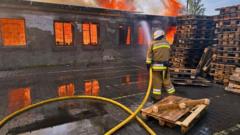A recent report from Doctors Without Borders highlights the alleged failure of the Ethiopian government to investigate the murder of three aid workers in 2021, calling for justice and accountability amidst ongoing hostility towards international aid groups.
Calls for Justice Intensify After Aid Workers’ Murders in Ethiopia

Calls for Justice Intensify After Aid Workers’ Murders in Ethiopia
Doctors Without Borders demands accountability as new evidence points to Ethiopian soldiers in the killings of three aid workers during the Tigray conflict.
Article text:
In a chilling revelation, Doctors Without Borders (Médecins Sans Frontières) has accused the Ethiopian government of neglecting to adequately investigate the tragic slayings of three aid workers in the northern Tigray region in June 2021. This accusation accompanies the release of a new report that implicates Ethiopian soldiers in the executions, and follows a similar investigation conducted by The New York Times that established military involvement in the incident.
At a press conference in Nairobi on Tuesday, senior official Raquel Ayora denounced the killings, stating, “Our team was executed. There is no way the perpetrators could not know that they were killing civilians.” The harrowing context of these events unfolded during a brutal civil war in Ethiopia, where humanitarian workers have faced increasing peril.
While the report does not conclusively name individuals, it draws parallels to the findings from the 2022 New York Times investigation that identified an Ethiopian military officer who purportedly commanded that the aid workers be "finished off" shortly before their deaths. The atmosphere surrounding the killings was reportedly charged, with the Ethiopian government exhibiting hostility towards aid organizations prior to the incident.
Despite assurances from Ethiopian authorities regarding an ongoing investigation, families of the victims have not received credible information about the circumstances surrounding the tragic event. Doctors Without Borders has expressed concern over the lack of transparency and accountability, urging the Ethiopian government to act decisively to bring those responsible to justice.
The deaths of the three aid workers stand as a grim reminder of the dangers faced by international humanitarian efforts amid armed conflict, underscoring the urgent need for protection and respect for those dedicated to providing aid in times of crisis.
In a chilling revelation, Doctors Without Borders (Médecins Sans Frontières) has accused the Ethiopian government of neglecting to adequately investigate the tragic slayings of three aid workers in the northern Tigray region in June 2021. This accusation accompanies the release of a new report that implicates Ethiopian soldiers in the executions, and follows a similar investigation conducted by The New York Times that established military involvement in the incident.
At a press conference in Nairobi on Tuesday, senior official Raquel Ayora denounced the killings, stating, “Our team was executed. There is no way the perpetrators could not know that they were killing civilians.” The harrowing context of these events unfolded during a brutal civil war in Ethiopia, where humanitarian workers have faced increasing peril.
While the report does not conclusively name individuals, it draws parallels to the findings from the 2022 New York Times investigation that identified an Ethiopian military officer who purportedly commanded that the aid workers be "finished off" shortly before their deaths. The atmosphere surrounding the killings was reportedly charged, with the Ethiopian government exhibiting hostility towards aid organizations prior to the incident.
Despite assurances from Ethiopian authorities regarding an ongoing investigation, families of the victims have not received credible information about the circumstances surrounding the tragic event. Doctors Without Borders has expressed concern over the lack of transparency and accountability, urging the Ethiopian government to act decisively to bring those responsible to justice.
The deaths of the three aid workers stand as a grim reminder of the dangers faced by international humanitarian efforts amid armed conflict, underscoring the urgent need for protection and respect for those dedicated to providing aid in times of crisis.





















